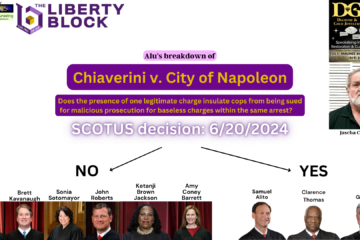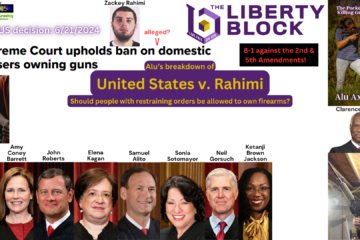By Ian Underwood
A fiduciary is someone who has a legal obligation to place the interests of another party above his own interests.
We normally see this term used when talking about things like investment advice, retirement planning, and so on. For example, if selling you a security or policy or other product would be good for a fiduciary, but bad for you, then he can’t sell it to you. But it applies to other areas as well.
For example, a real estate agent has a fiduciary responsibility to his client. If an offer is better for the client, but worse for the agent, the agent can’t hide that offer from the client, or try to talk the client out of accepting it.
Trustees, guardians, and executors are fiduciaries. So are doctors and lawyers. One might argue that parents have a fiduciary responsibility to their children, at least in some contexts.
So the idea of a fiduciary isn’t something odd, or uncommon, or difficult to understand.
Interestingly, we find it even at the heart of at least one martial art.
Morihei Ueshiba, the founder of Aikido, often referred to Aikido as ‘the art of peace’, and regarded the idea of protecting one’s attacker as essential to both its theory and its practice.
One of Aikido’s foremost teachers, George Leonard, put it this way:
Aikido is not the denial of violence, it’s the refusal of violence. It gives us a chance again and again to refuse violence. Right in the middle of a storm of violence, we again and again say: No, we’ll protect the attacker.
While no one uses the word when talking about Aikido, it’s essentially a fiduciary approach to dealing with potentially violent situations.
I bring this up because there is one area of modern life where society would benefit greatly from establishing a fiduciary approach to potentially violent situations, but where we seem to have gone in the opposite direction instead.
With the advent of ubiquitous recording, it’s becoming clearer every day that police officers are primarily concerned with their own safety (and convenience), and only secondarily concerned with the safety (and rights) of the people they interact with. Also, that they are as likely to be rewarded as punished for even the most appalling behavior.
In fact, the legal doctrine of qualified immunity has moved us about 180 degrees away from the concept of a fiduciary relationship with the police:
The doctrine of qualified immunity essentially says that for a police officer to be held accountable, there must be a statute specifying all the particularities of his or her unique situation. Anything even remotely ambiguous falls under the broad category of ‘discretion’. In theory, legal immunity is qualified, but in practice, it is effectively absolute.
That is, ‘fiduciary’ and ‘qualified immunity’ have become mutually exclusive concepts. We can have one, or the other, but not both.
So far, choosing the latter hasn’t been working out so well. Look up names like Charles Kinsey, David Dehmann, Daniel Shaver, Walter Scott, Willie McCoy, William Devaughn Smith, Gary J. Willis, Brandon Ellingson, Anthony Lamar Smith, Eric Garner, and Philando Castile. Compare what happened to them, with what happened to the officers who interacted with them. And spend a few moments thinking about how the situations could have been resolved without death or serious injury, if that had been the primary goal in each encounter.
A better way to do things would begin with taking seriously some of what are now merely euphemisms.
For example, what if ‘peace officers’ were required to treat the peaceful resolution of situations, not as a luxury, but as a priority? What if the ‘Department of Safety’ was required to treat keeping even alleged criminals safe, not as a nicety, but as a necessity?
That is, what if — just as with doctors and lawyers — we regarded police officers as fiduciaries, adjusted their training to reflect that, and cut loose the ones who aren’t temperamentally suited for that kind of career?
If a doctor, or a lawyer, or a real estate agent, or any other fiduciary breaches that relationship, a number of things might happen to him. Depending on which state he practices in, it might result in jail time, or a civil suit. But it almost always results in a loss of license or certification. That’s the absolute minimum that should happen to a police officer who, for example, shoots someone running away from a traffic stop.
It would be simple enough to switch from ‘qualified immunity’ to ‘fiduciary’ as the standard that must be met by police officers. A brief RSA, as follows would do it.
Rather than qualified immunity, law enforcement officers have a fiduciary responsibility to members of the public, including alleged criminals. Breach of this responsibility will result in lifetime loss of certification, and revocation of any pension or other benefits.
I’m dreaming, right? Well, as Milton Friedman once said,
“There is enormous inertia — a tyranny of the status quo — in private and especially governmental arrangements. Only a crisis — actual or perceived — produces real change. When that crisis occurs, the actions that are taken depend on the ideas that are lying around. That, I believe, is our basic function: to develop alternatives to existing policies, to keep them alive and available until the politically impossible becomes politically inevitable.”
I concede that fiduciary policing is currently politically impossible. But I also believe that technology is moving us closer each day towards the crisis that will make it politically inevitable.
The alternative?
If the police and the courts continue to actively subvert the ability of citizens to hold the police accountable within the justice system, then those citizens will start finding ways to impose accountability outside of that system. And that’s something we should be doing everything within our power to avoid.
This article was originally published on GraniteGrok.com


